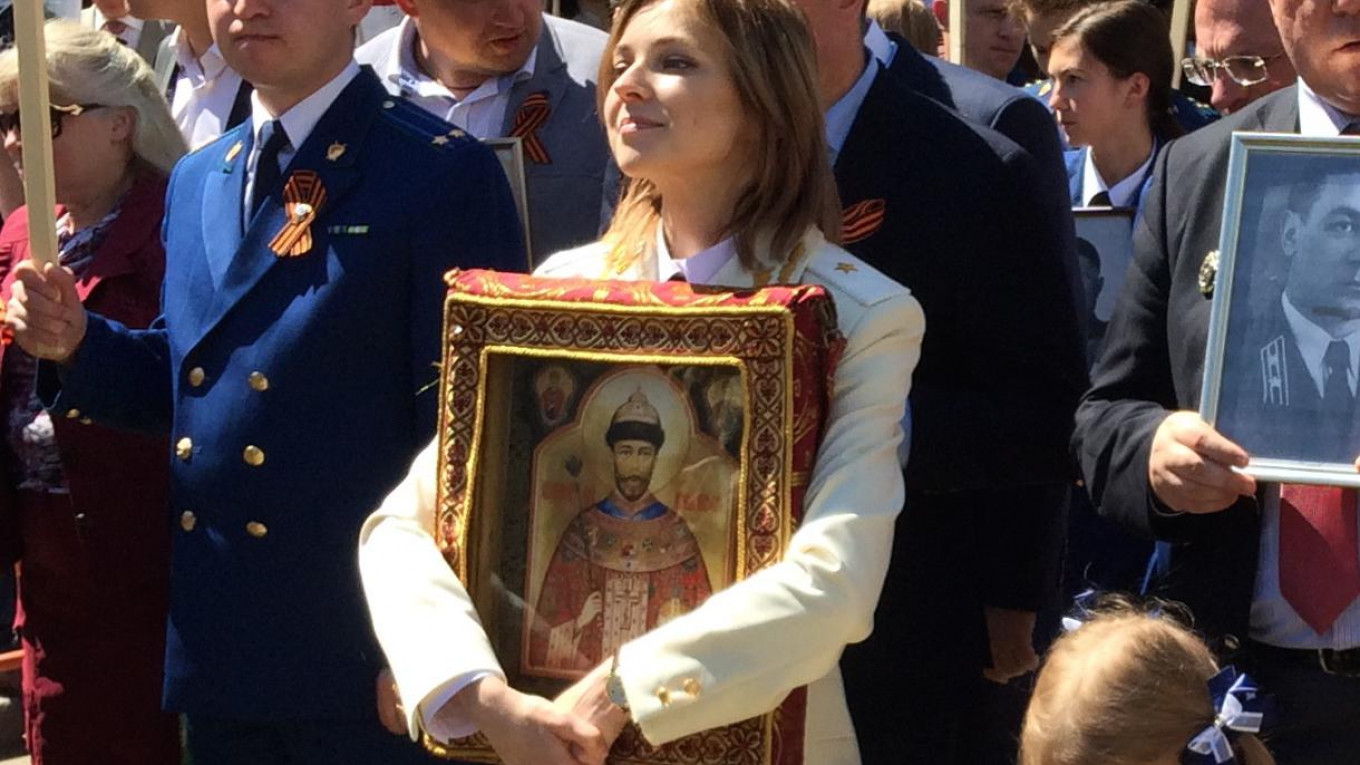Since Duma Deputy Natalya Poklonskaya announced on national television that a bust of Tsar Nicholas in Crimea had started weeping, Russians have been divided over whether to cry foul — or hallelujah.
What happened? (Or did it?)
It all began on March 3 when Poklonskaya, the former General Prosecutor of Crimea who is now a State Duma deputy, told the nationalist Tsargrad TV channel that a bust of Tsar Nicholas II in Simferopol had been seen “weeping.”
“My colleague in Crimea phoned me and said: ‘This morning the bust of Nicholas on the square next to the chapel started weeping!’" Poklonskaya told a female presenter, who in turn responded with a polite: "No way!"
A smiling Poklonskaya noted that the miracle had coincided with the centenary of the Tsar’s abdication. “The statesman is helping us. After all, they [the Romanovs] died so that we could make Russia flourish and great,” she said. “It's a miracle that cannot be explained by scientists or anyone.”
A church elder later told national media that the “miracle” had been going on for days. He added that it hadn't just been the Tsar’s bust that had shed tears — some of the icons inside the chapel had started weeping, too.
Why is Poklonskaya obsessed with the Romanovs?
This is not the first time that Poklonskaya has publicly celebrated the last Russian Tsar.
The bust she referred to in the Tsargrad TV appearance was erected — along with a chapel — at her initiative in October last year. Coincidentally, they went up beside her former workplace — the Simferopol prosecutor's office.
Since the Tsar and his family were canonized in 2000, protecting their reputation has become a holy matter. Poklonskaya has recently
made headlines as the instigator of a scandal surrounding a biopic of the Tsar slated to come
out later this year. The film details the love affair between the young
Tsar and a Polish ballerina. Poklonskaya is calling for prosecutors to
investigate whether the film tarnishes Nicholas II's image or
constitutes an invasion of his privacy.
Nonetheless, the decision to canonize the Romanovs has been disputed. Some point to the fact that Nicholas II voluntarily abdicated the throne, and that the family had ties to the controversial monk Grigory Rasputin as obstacles to their sainthood.
But in the eyes of "tsar-worshippers," a group of Orthodox believers whose ranks reportedly include Poklonskaya, Nicholas II sacrificed himself to redeem Russians' sins, in an analogy of the self-sacrifice made by Jesus Christ.
The group has yet to win over the Orthodox Church, which has described that belief in Nicholas II as a savior as “heresy” and the group a “cult.”
Awkward...
This makes Poklonskaya's very public obsession with Nicholas II a source of embarrassment for the Church.
In a Facebook post that asked whether the weeping statues were “an omen or a fraud,” one Orthodox bishop wrote that Poklonskaya should be given the benefit of the doubt: “let's not criticize the young, politically inexperienced woman deputy.”
He nevertheless said he had personal experience with similar miracles and called for “a careful investigation of such phenomena.”
Not long after, a special committee of five Orthodox Church clergymen was set up to scrutinize the bust. On March 7, they concluded they had not found any tears (or signs thereof) on the bust, the Interfax news agency reported. But, they added, the bust would continue to be "closely monitored" just in case.
In the meantime, the miracle appears to be spreading. The head of the local administration of the city of Svetogorsk, Sergei Davydov, told the news site 47news he had seen tears on a statue of Bolshevik revolutionary Vladimir Ilyich Lenin, too.
“I was walking past the square and noticed a barely perceptible change in the face of our former leader,” he said. “I went up close and saw that a tear was rolling down Ilyich's face.”
“It was certainly not a raindrop,” he said, concluding "real miracles are happening in Russia."
A Message from The Moscow Times:
Dear readers,
We are facing unprecedented challenges. Russia's Prosecutor General's Office has designated The Moscow Times as an "undesirable" organization, criminalizing our work and putting our staff at risk of prosecution. This follows our earlier unjust labeling as a "foreign agent."
These actions are direct attempts to silence independent journalism in Russia. The authorities claim our work "discredits the decisions of the Russian leadership." We see things differently: we strive to provide accurate, unbiased reporting on Russia.
We, the journalists of The Moscow Times, refuse to be silenced. But to continue our work, we need your help.
Your support, no matter how small, makes a world of difference. If you can, please support us monthly starting from just $2. It's quick to set up, and every contribution makes a significant impact.
By supporting The Moscow Times, you're defending open, independent journalism in the face of repression. Thank you for standing with us.
Remind me later.






